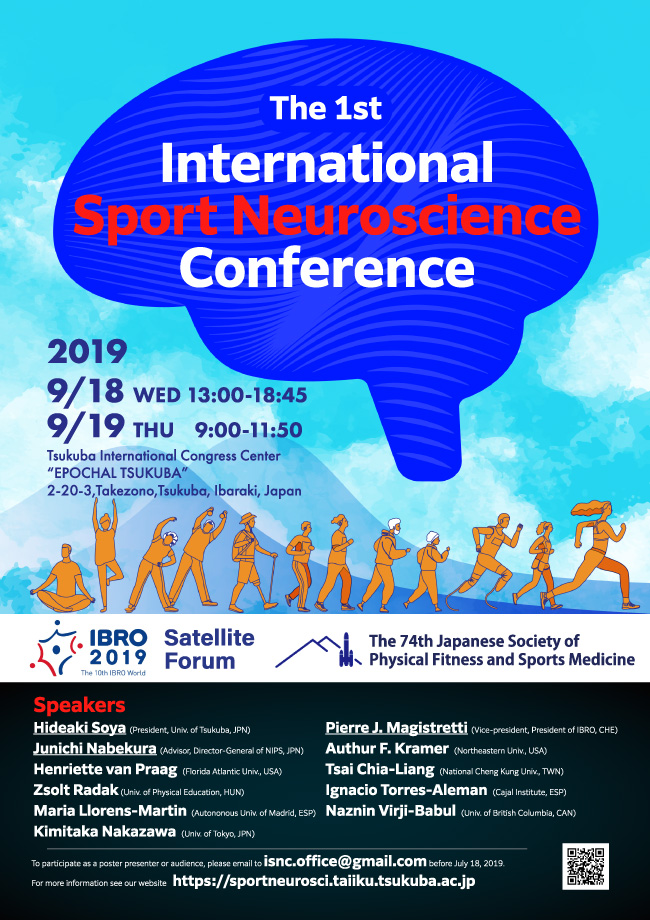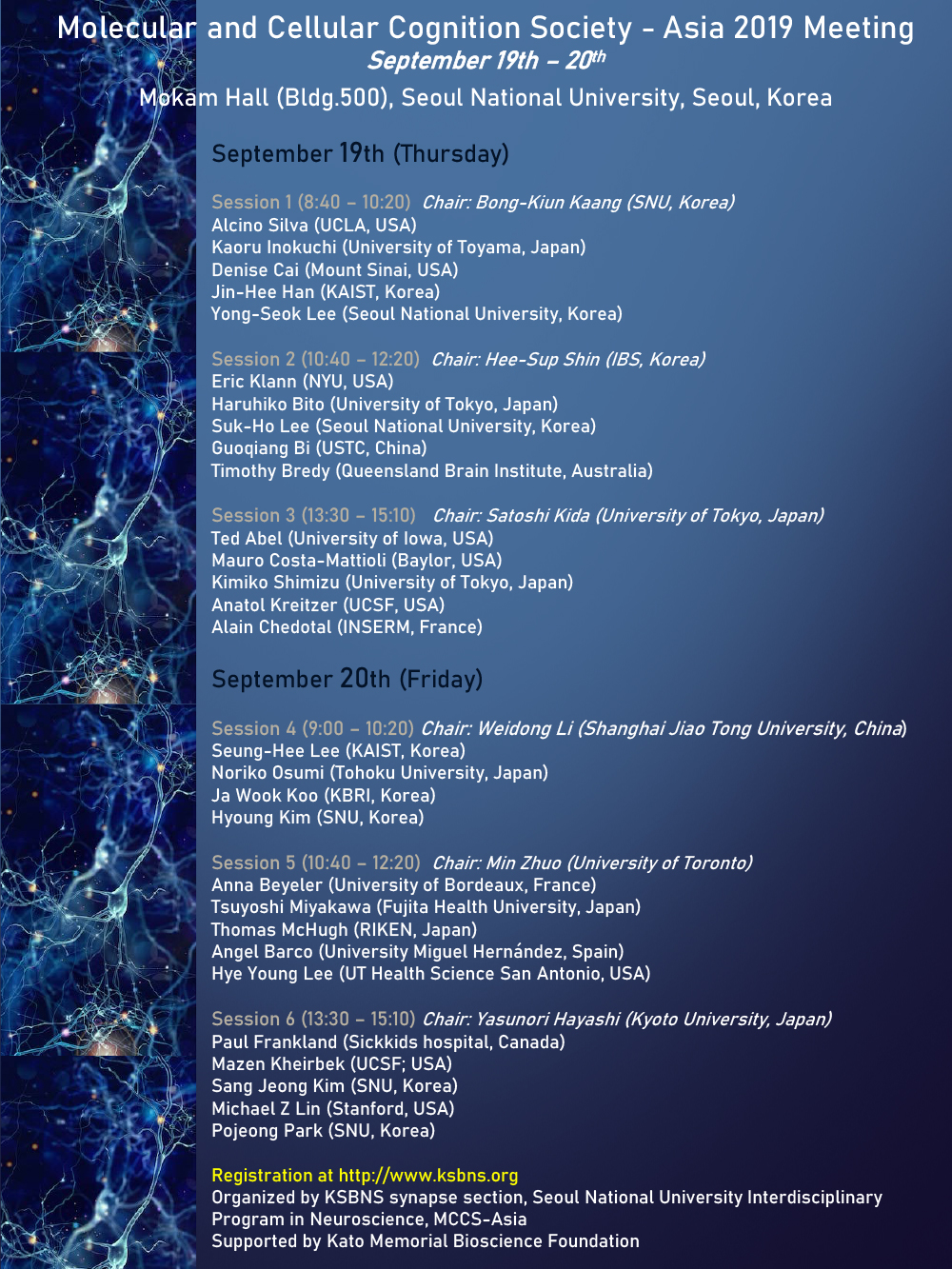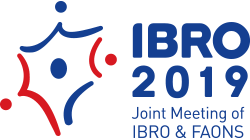Scientific Program
Satellite Meetings / Events
Home > Scientific Program > Satellite Meetings / Events
- IBRO satellite for International Sport Neuroscience Conference (hosted by Japan Sport Neuroscience Meeting / JSPFSM)
-
- Organizer NameHideaki Soya
- Organizer AffiliationDepartment of Sports Neuroscience, Advanced Research Initiative for Human High
Performance (ARIHHP), Faculty of Health and Sport Sciences, University of Tsukuba, Japan - Organizer E-mailsoya.hideaki.gt@u.tsukuba.ac.jp
- Host OrganizationJapan sport neuroscience meeting / JSPFSM
- TopicSport neuroscience
- Event TypeMeeting
- Event NameIBRO satellite for International Sport Neuroscience Conference
- Day/Time2019/9/18 (PM) – 2019/9/19 (AM)
- Place Tsukuba City, Japan / International Congress Center EPOCHAL TSUKUBA
- How to attend? Open to public
- No. of Participants100
- DescriptionThe aim of the Satellite is to share current topics with researchers who are engaged in work related to neuroscience research on exercise and sports based on behavioral neuroscience, cognitive neuroscience and neuro-rehabilitation, together with those in fields of physiology, biochemistry, health fitness, and so on. The following are some potential focuses: How do exercise and sports impact brain functions and health? How does exercise contribute to reducing neurodegenerative diseases? What role do brain functions play in exerting human high performance?
Our committee is comprised of following members: Prof. Pierre Magistretti (KAUST, EPFL, IBRO’s President); Prof. Junichi Nabekura (NIPS, President of FAOPS2019); Prof. Ryoichi Nagatomi (Tohoku Univ., chairperson of JSPFSM negotiations committee); Prof. Ignacio Torres-Aleman (Cajal Institute); Prof. Michael Yassa (UC-Irvine); Prof. Zsolt Radak (Univ. of Phys. Edu. Hungary); Prof. Yu-Min Kuo (NCKU); Prof. Joon-Yong Cho (Korea National Sport Univ.); Prof. Hideaki Soya (Univ. of Tsukuba). Underlined names will be main presenters.
Our present plan is to schedule the Satellite on Sep.18 (Wed)-19 (Thu) at Tsukuba City (International Congress Center EPOCHAL TSUKUBA; https://www.epochal.or.jp/eng/index.html). This is just before the IBRO conference at Taegu and the annual meeting of the Japanese Society of Physical Fitness and Sports Medicine (JSPFSM). The date is very convenient for those attending the IBRO conference, and we can use conference rooms in the same Congress Center. To encourage young researcher to attend the satellite, young investigator travel awards will be available.
- International Symposium on Neurogenesis, Regeneration and Pain (hosted by Neurospine, ASIA SPINE)
-
- Organizer NameYoon Ha and Inbo Han
- Organizer AffiliationThe Korean Spinal Neurosurgery Society, Korea
- Organizer E-mailhanib@cha.ac.kr, HAYOON@yuhs.ac
- Host OrganizationNeurospine, ASIA SPINE
- TopicNeurogenesis, Regeneration and Pain
- Event TypeAnnual meeting
- Event NameInternational Symposium on Neurogenesis, Regeneration and Pain
- Day/Time2019/09/20 (1:30-5:30PM)
- Place Seoul Dragon City
- How to attend? Applicants only
- No. of Participants200
- DescriptionNeurospine (ISO abbreviated journal name, Neurospine), the official journal of ASIA SPINE, the Neurospinal Society of Japan, Taiwan Neurosurgical Spine Society, and the Korean Spinal Neurosurgery Society, is an international peer-reviewed open-access journal which published quarterly. The journal includes neuroscience and pain research, bone and disc research in the area of spine, spinal cord and peripheral nerve diseases. Neurospine is indexed/tracked/covered by Emerging Sources Citation Index (ESCI), PubMed, PubMed Central, KoreaMed, KoMCI, EBSCO host and Google Scholar. We are working on the more development of the journal. So the event is planned and is planning to be held during the annual meeting of the 10th ASIA SPINE (Sep. 19-21, 2019 Seoul Dragon City, Korea). We are planning to hold the event on Sep. 20 (1:30-5:30pm), invite many experts in Neuroscience from many countries including China, and cover topics on Neuroscience. We expect more than 200 attendees; Neurosurgeons, Orthopedic Surgeon, Neuroscientist. IBRO aims to promote neuroscience research and communication among researchers around the world and has the aims and standards of IBRO with an excellent scientific program. So we strongly want to hold our event as a satellite event of IBRO 2019.
- IBRO satellite meeting for ‘Synaptic Function and Neural Circuitry’ (hosted by Institute for Basic Science/KAIST and Leibniz Institute for Neurobiology)
-
- Organizer NameEunjoon Kim and Michael R. Kreutz
- Organizer AffiliationInstitute for Basic Science/KAIST and Leibniz Institute for Neurobiology, Korea and Germany
- Organizer E-mailkime@kaist.ac.kr, kreutz@lin-magdeburg.de
- Host OrganizationInstitute for Basic Science/KAIST and Leibniz Institute for Neurobiology
- Websitewww.ibro2019-satellite.org
- TopicSynaptic Function and Neural Circuitry
- Event TypeMeeting
- Event NameIBRO satellite meeting for ‘Synaptic Function and Neural Circuitry’
- Day/Time2019/9/18-2019/9/20
- Place Shilla Stay, Haeundae, Busan, Korea
- How to attend? Applicants only
- No. of Participants~100 people
- DescriptionThe meeting will cover several aspects of synaptic function, ranging from synaptic proteostasis and architecture to neuropsychiatric disorders and the molecular underpinnings of neural circuit function. Because the number of participants will be limited to approximately 100, we can promise an interesting small conference with intense discussions in a relaxed atmosphere. The meeting will start in the evening on September 18 and end on the morning of September 21 with an optional social tour. There will be poster presentations, and the best posters will be selected for short oral presentations. The speakers who have agreed to participate, including two plenary speakers, are as follows:
Haruhiko Bito (University of Tokyo)
Tobias M. Boeckers (Ulm University)
Nils Brose (Max Planck Institute for Experimental Medicine)
Daniel Choquet (University of Bordeaux)
Yukiko Goda (RIKEN)
Eckart D. Gundelfinger (Leibniz Institute for Neurobiology; plenary lecture)
Volker Haucke (Forschungsinstitut für Molekulare Pharmakologie)
Johannes W. Hell (University of California Davis)
Yi-Ping Hsueh (Academia Sinica)
Jaewon Ko (Daegu Gyeongbuk Institute of Science and Technology)
C. Justin Lee (Institute for Basic Science)
Marina Mikhaylova (Center for Molecular Neurobiology, Hamburg)
Thomas Oertner (Center for Molecular Neurobiology, Hamburg)
Carlo Sala (Istituto di Neuroscienze)
Peter Scheiffle (University of Basel)
Stephan Sigrist (Freie Universität Berlin)
Morgan Sheng (Genentech; plenary lecture)
Hee-Sup Shin (Institute for Basic Science)
Scott Soderling (Duke University)
Toru Takumi (RIKEN)
Matthijs Verhage (Vrije Universiteit)
Ofer Yizhar (Weizmann Institute of Science)
Michisuke Yuzaki (Keio University)
- Molecular and Cellular Cognition Society-Asia 2019 meeting (hosted by MCCS, Synapse Section of the KSBNS, Seoul National University)
-
- Organizer NameBong-Kiun Kaang, Satoshi Kida, Yong-Seok Lee, Jin-Hee Han
- Organizer AffiliationSeoul National University & KAIST, Korea
University of Tokyo, Japan - Organizer E-mailkaang@snu.ac.kr, kida@nodai.ac.jp, yongseok7@snu.ac.kr, han.jinhee@kaist.ac.kr
- Host Organization Molecular and Cellular Cognition Society (MCCS), Synapse Section of the KSBNS, Seoul National University
- TopicAdvances in Molecular and Cellular Cognition Research
- Event TypeMeeting
- Event NameMolecular and Cellular Cognition Society-Asia 2019 meeting
- Day/Time2019/9/19 (full day) – 20 (AM)
- Place Seoul National University Gwanak Campus, Mok-Am Hall (Bldg 500)
- How to attend? Applicants only
- No. of Participants250
- DescriptionThe MCCS is an international organization focused on fostering exchanges in the field of Molecular and Cellular Cognition, with headquarters in North America, and major branches in Asia and Europe.
This symposium will be co-organized by MCCS-Asia and the synapse section of the KSBNS. The aim of the conference is to provide a platform for prominent experts from both overseas and local scientists, especially members of KSBNS, to discuss and share the latest developments in molecular, cellular and systemic aspects of cognition in health and disease.
Confirmed speakers include Ted Abel (University of Iowa, USA), Angel Barco (University Miguel Hernández, Spain), Anna Beyeler (MIT, USA), Haruhiko Bito (Univ of Tokyo, Japan), Alain Chedotal (INSERM, France), Mauro Costa-Mattioli (Bayler, USA), Paul Frankland (Sickkids hospital, Canada), Jin-Hee Han (KAIST, Korea), Kaoru Inokuchi (Univ of Toyama, Japan), Mazen Kheirbek (UCSF, USA), Hyoung Kim (SNU, Korea), Sang Jeong Kim (SNU, Korea), Eric Klann (NYU, USA), Anatol Kreitzer (UCSF, USA), Ja Wook Koo (KBRI, Korea), Hye Young Lee (UT Health Science San Antonio, USA), Seung-Hee Lee (KAIST, Korea), Suk-Ho Lee, (SNU, Korea), Micheal Z Lin (Stanford, USA), Thomas McHugh (RIKEN, Japan), Tsuyoshi Miyakawa (Fujita Medical Univ, Japan), Noriko Osumi (Tohoku Univ, Japan), Pojeong Park (SNU, Korea), Kimiko Shimizu (Univ. of Tokyo), Alcino J. Silva (UCLA, USA). Many of the confirmed speakers will present different talks from those will be given at IBRO 2019.
Registration is required, please register at KSBNS website (www.ksbns.org). The final program is also available at the website.
This satellite meeting is generously supported by Kato Memorial Bioscience Foundation.
- IBI International Brain Initiative Meeting
-
- Host OrganizationInternational Brain Initiative (IBI)
- TopicInternational Brain Initiative (IBI) Meeting
- Event TypeMeeting
- Event NameInternational Brain Initiative (IBI) Meeting
- Day/Time2019.9.23~24
- Place Hotel Inter-Burgo EXCO
- How to attend? Invitations only
- No. of Participants30
- Description-
- Global Neuroethics Summit (GNS) 2019
-
- Host OrganizationGlobal Neuroethics Summit (GNS)
- TopicGlobal Neuroethics Summit (GNS) 2019
- Event TypeMeeting
- Event NameGlobal Neuroethics Summit (GNS)
- Day/Time2019.9.25~27
- Place Hotel Inter-Burgo EXCO
- How to attend? Invitations only
- No. of Participants50
- DescriptionThe annual Global Neuroethics Summit will take place in in Daegu, Republic of Korea on Sept 25-27, 2019, following the IBRO congress. At this meeting each of the brain projects will present preliminary data from the surveys. We will use this information to discuss how the relevance and utility of the five NeQN in future engagement practices and education programs.



